Lessons from History
Since this blog started, we have published 30 reviews.* Among its offerings, it is striking to see more and more stories about encounters – too often violent – with Australia’s First Nations. Most of these stories are told by professional rather than academic historians. How history is written is another recurring theme, one that coincides with my aim as the blog editor of encouraging succinct, engaging distillations of current work. We need our history-making to be read! Lessons from history makes the same point, urging historians to engage with policy and to bring history to the fore of confronting contemporary challenges.
READ REVIEW
↓
LeSSONS FROM HISTORY: leading historians tackle australia’s greatest challenges
carolyn Holbrook, lyndon megarrity, David lowe (editors) | 2022
The 22 essays in the book tackle important public policy issues, many of which are the wicked problems that confound successive governments: climate change, relations with China, inequality, migration and more. Nearly all the essays are written by academics; the perspective of the public historian is ignored. That is regrettable, for it is often the type of history commissioned at local and state level that has, by its very nature, engagement with decision makers.
Each essay ends with a section titled ‘Lessons from history’. Some writers urge more understanding of the past; others recommend bipartisanship or boldness. Others, the more seasoned thinkers or those with direct experience of the policy process, avoid such generalities. Theirs is a better way to couch recommendations: don’t tell the politicians what to do; give them some ideas about how.
Take, for example, the chapter on water policy – so topical as floods continue to inundate towns in NSW and Victoria – which concludes from its survey of the social history of water:
… there is a pressing need to treat water supply and sanitation holistically, as a set of habits, institutions and infrastructure entangled in wider social and environmental contexts. In the past, responses to urban water issues have been dominated by engineering and infrastructure, rather than tackling the more difficult long-term work of cultural adaptation.
That should give policy makers some options for working differently.
David Lowe examines the issue of foreign aid. What he recommends is not new but comes with the ballast of historical review. He shows that the mish-mash of purposes articulated for foreign aid has not built consistent support from the Australian public. What might attract that support is an aid policy that is seen as part of building Australia’s reputation as a good international citizen, rather than being the ‘preserve of “court politics” played out by a select few in Canberra’.
Another of the editors, Carolyn Holbrook, laments the lack of enthusiasm, especially in comparison with Anzac fervour, for the achievement of federation. She suggests Australia needs to build a democratic legend based on the history and concept of Australian democracy. Pride in Australia’s democratic history could be celebrated on a new Australia Day, 29-30 March, when the first Commonwealth elections were held in 1901. This might have widel appeal if it were a two-day holiday!
More radical, and more pertinent as the climate crisis worsens, is a call to throw out directional history, history rooted in the idea of progress. As Yves Rees puts it:
Progress is a death sentence, and human futures will only be possible if we adopt other ways of being and knowing.
Here we have much to learn from First Nations peoples who see the past, present and future as one time, what WEH Stanner coined ‘everywhen’.
Lessons from History is published by UNSW Press.
Reviewer: Francesca Beddie (PHA NSW & ACT)
*Thanks go to all the reviewers, to the publishers who have supplied us with copies of their books, and to Fiona Poulton who manages the blog site and is a keen proofreader. Finally, a question? Should the blog continue? Reply to fbeddie@makeyourpoint.com.au or fionapoulton@gmail.com

